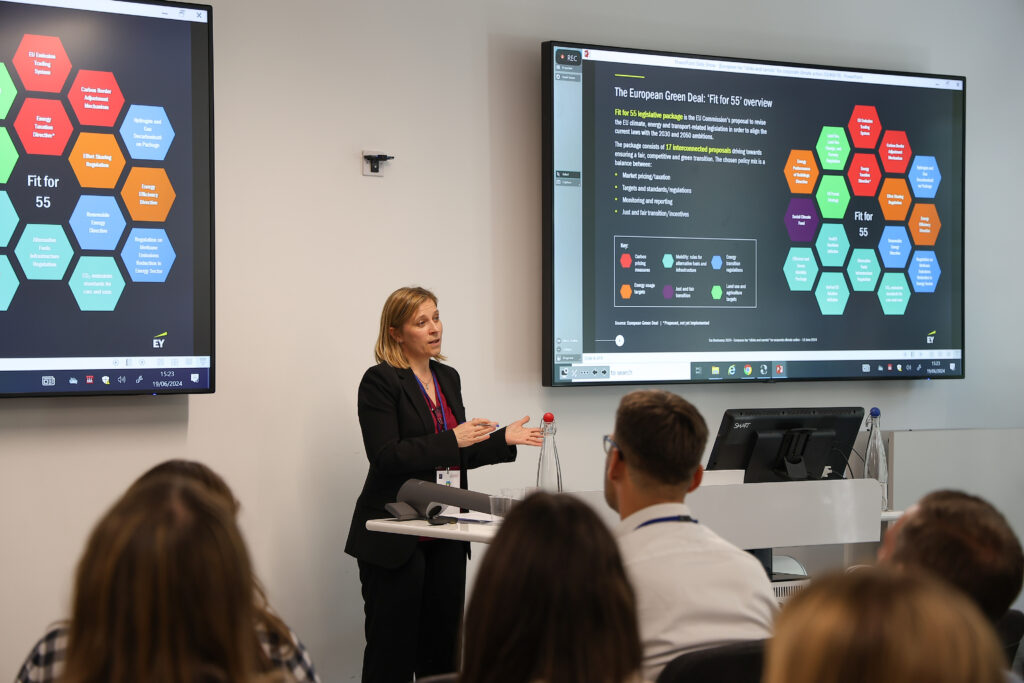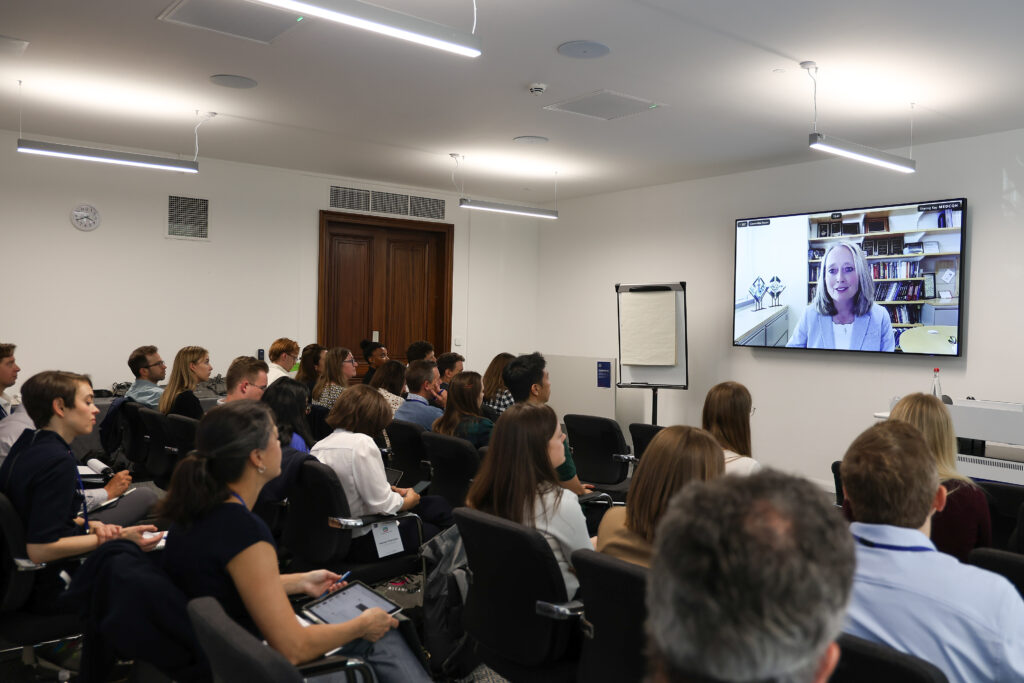The second session of the Tax Bootcamp 2024, held at London Business School and supported by the Wheeler Institute, moved the conversation away from AI towards taxation and climate action. It was structured around presentations from two speakers, each representing diverse perspectives on climate action from both Europe and the United States on taxation for climate action and its global implications, including developing countries.
This article is the second in a three-part series. Find out more about parts one and three of the Bootcamp now: ‘Tax Strategies and the Technological Revolution: Accounting for AI‘; ‘New Research on Taxes and Transparency Regulation for Sustainability‘.

European Tax Sticks and Carrots for Corporate Climate Action: Alenka Turnsek (EY EMEIA Sustainability Tax Leader)
Perhaps the easiest way to think about EU tax and climate action is as a set of incentives and punishments, or ‘Sticks’ and ‘Carrots’. This was the case made by Alenka Turnsek as she discussed the European Green Deal and ‘Fit for 55’.
Turnsek began by outlining the EU’s policy for dealing with climate change. The policy consists of 17 interconnected proposals. These proposals are a balance between: market pricing/taxation; targets and standards/regulations; monitoring and reporting; and just and fair transition/incentives. Its ‘sticks’ relate to regulation around requirements and reporting, and the ‘naming and shaming’ of companies that do not uphold them. These come in the form of the EU Emission Trading Systems, Carbon Border Adjustment Mechanism, Energy Transaction Directive, Energy Efficiency Directive and Effort Sharing Regulation. The EU Social Climate Fund is the main ‘carrot’ in their arsenal, which, Turnsek admitted, is little in comparison to the sticks. The emphasis therefore is on punishment over incentive.
Turnsek then explained EU carbon pricing measurements and green policies. These include the Emissions Trading Scheme (ETS); Carbon taxes; Carbon Border Adjustment Mechanism (CBAM); Energy Taxation Directive (proposed); Voluntary Carbon Credits/(Article 6 Paris Agreement). The EU really want other countries to introduce carbon pricing measures.Monitoring has been in place since 2023 and prices will be in place from 2026. She added that the EU doesn’t like to use carbon credits – it thinks that people should reduce emissions, not offset them. But this is hugely popular in the rest of the world.
She then addressed the long list of sustainability policies that must align for climate action to work. ‘We create emissions with everything we do, particularly from being in an economy.’ Turnsek began, ‘so circular economies are vital.’ We also need biodiversity and clean water, minimal pollution, and drastically different patterns of consumption to influence behaviour. Tax can play a key role in all of this in the form of taxes on high-emission foods, transportation-related taxes etc.
Financing the green transition is a challenge, but the funds are being generated. Turnsek discussed the ‘trillion promise’ made in 2019, and emphasised the funds made available by the EU Green Deal. But the 2022 EU Inflation Reduction Act drew attention to lack of incentives. The 2023 Foreign Subsidies Regulation and Green Deal Industrial Plan, as well as the 2024 Net Zero Industry Act are in place to motivate corporations – and economies as a whole – to achieve a fair, green and digital transition that will secure a resilient future. The world prefers incentives to taxes, but we need carbon pricing because the global economy difficulties. More countries will introduce carbon pricing of some sort, and more international initiatives are needed to ensure that there is no carbon leakage to developing countries, or that net emissions are reduced rather than exported.

The U.S. Perspective on Tax Incentives for Climate Action: Michelle Hanlon (Professor of Accounting at MIT)
Michelle Hanlon stressed that there is no cohesive US perspective on tax incentives for climate action. Different political parties have a range of agendas and priorities which have implications for climate policy and therefore tax. But in general, the current U.S. government’s policies are ‘all carrots.’
The main piece of U.S. legislation is the 2022 Inflation Reducation Act (IRA). This act is widely viewed as the largest investment in climate and energy security that the U.S. has ever made. Some would stay this still is not enough based on what they want to achieve, but it is massive compared to the historical pattern espoused by the country. Hanlon paused to remind listeners that this legislation was passed by the Democrats – i.e. only by one party, which will be important going forward.
The act involves the creation or expansion of over 20 tax credits. These credits relate to specific, measurable markers of transition that corporations can carry out, assigned for activities such as nuclear power production, the use of hydrogen fuel cells, sustainable aviation, production and use of EVs etc. Lots of new carrots are there for people to invest in creating energy efficient and sustainable solutions, as part of the wider mission to bring the U.S. into the forefront of these new technologies and innovations.
The scale of these credits has been hugely expanded – there are more credits and more mechanisms to make them usable. Most of these credits are not capped, and some can be sold to a third party. There are some ‘requirements’ (which should be conflated with ‘sticks’…), such as the ‘domestic content requirement’, which gives another 10% booster to these credits when they involve domestic production, which the taxpayer needs to conform to. Kickers are stackable, so there is quite a large incentive to meet all of the requirements set out by the act.
‘What will it cost?’ Hanlon asked, ‘the short answer is, we don’t know’. The original score estimated by the Joint Committee on Taxation (JCT) in 2022 was $271 billion. In 2023 it went up to $536 billion. Some academics such as Bistline, Mehrotra, and Wolfram (2022) estimate that the figure will be closer to $1.2 trillion. ‘Is it working? We know that the sale of EV cars has gone up – there has been a 50% increase in sales YoY from 2022. Twelve States have some kind of carbon pricing, particularly East and West coasts.’
Why don’t we have a carbon tax in the US? One answer is that it might just be politically infeasible. Carbon taxes raise energy prices, so a government would lose votes. Another is an economic theory: if you give tax incentives to businesses we can learn a lot, accelerate productivity in terms of green energy production since carrots and sticks will cause technological and innovative solutions to develop more quickly, so there might be better solutions for environmental impact not to carbon tax.

Q&A
Why have the EU and US taken such different approaches?
Alenka argued that the EU has always had a mixed approach and has a different economic philosophy that does not entirely focus on a market-led economy. The role of the state is bigger in the EU than in the U.S. We need money for social transition, which has to come from the state in terms of taxes. This is in the DNA of Europe.
Michelle suggested that the differences arise from the U.S.’ desire to become an exporter of these technologies so want to accelerate their development and become the world leader in these technologies. They therefore need to incentivise it.
What costs are some of these ESG advances having on the Global South?
Both speakers agreed that the IRA changed changed free trade, which was the norm when the EU Green Deal was originally set out. It forces the EU to also provide the incentives. Who will have the industries of the future? The EU is a fragmented market – it doesn’t have the size of the U.S. Where does it leave the Global South? The key question really is where is the Global South in this moment where incentivising is so important? Maybe creating a landscape where richer countries can compensate poorer countries is a start, and such policies are discussed at COP. It is important for the Global South to create a position in this because this competition is going on. The Global South has the raw materials and minerals, so they are not necessarily in a weak position.
About the organisers

Marcel Olbert is an Assistant Professor of Accounting at London Business School. Named as one of the 2024 Poets & Quants Best 40-Under-40 MBA Professors, his research interests focus on the real effects of corporate taxation and disclosure regulation – examining how multinational businesses respond to incentives that stem from their regulatory and macroeconomic environment. His broad range of experience includes investment banking within the M&A advisory group of JP Morgan London, strategy consulting with Roland Berger and international tax and private equity with PwC and Flick Gocke Schaumburg. Marcel also serves as an Associate Editor at the European Accounting Review. His work has been accepted for publication in The Accounting Review, the Journal of Accounting and Economics, the Journal of Accounting Research, and the Review of Financial Studies. His current research on tax reforms and multinational firm investment as well as on carbon taxes and carbon leakage in developing countries is featured by the Wheeler Institute for Business and Development. Marcel is seeking applications for professional research assistantships.

Rebecca Lester is an Associate Professor of Accounting and one of three inaugural Botha-Chan Faculty Scholars at Stanford Graduate School of Business. She is also a Research Fellow at the Stanford Institute for Economic Policy Research (SIEPR) and at the Hoover Institution. Her research studies how tax policies affect corporate investment and employment decisions. In particular, she examines the role of reporting incentives, disclosure regimes, and information frictions in facilitating or altering the effectiveness of cross-border, federal, and local tax incentives. Her recent work explores national-level tax benefits, such as U.S. manufacturing tax incentives, European intellectual property tax regimes, and tax loss offsets. Other work examines state, local, and neighborhood-level incentives, including firm-specific tax incentives and the recent Opportunity Zones tax incentive. Professor Lester received her PhD in accounting from the MIT Sloan School of Management, and she has a BA and a Masters of Accountancy from the University of Tennessee. Prior to her studies at MIT, she worked for eight years at Deloitte in Chicago, including five years in the M&A Transaction Services practice.
